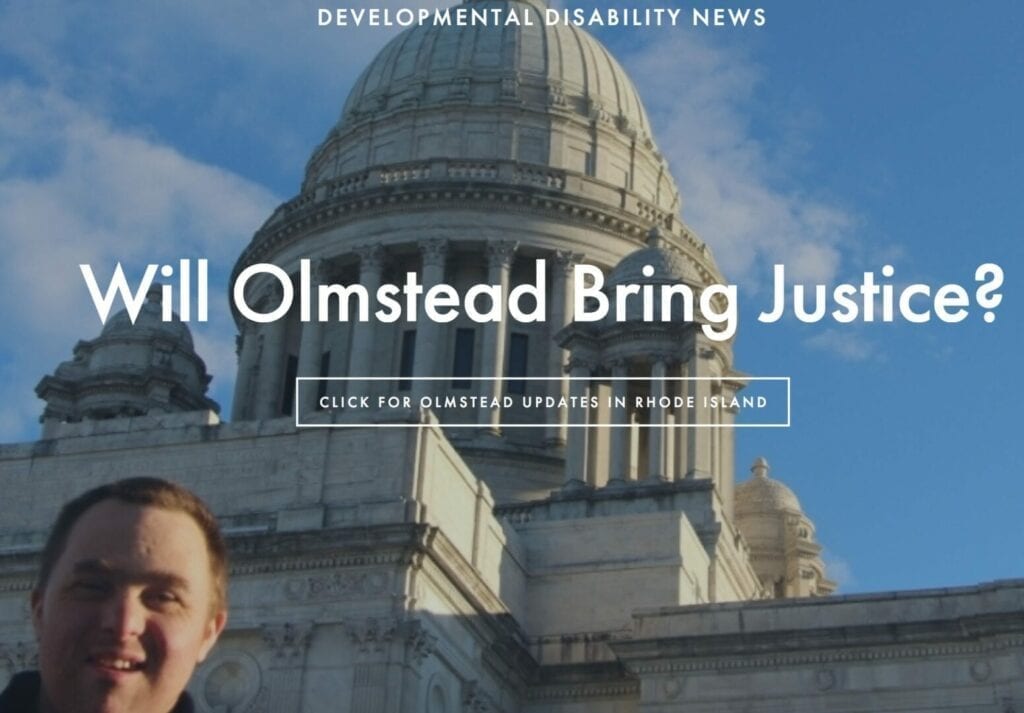Search Posts
Recent Posts
- Vinny Paz to be inducted TODAY into the International Boxing Hall of Fame – CES Boxing June 7, 2025
- In the News… quick recap of the week’s news (6.7.25) June 7, 2025
- Burn with Kearns: Strong without the spend: How scraps became strength tools – Kevin Kearns June 7, 2025
- Rhode Island Weather for June 7, 2025 – Jack Donnelly June 7, 2025
- How to advocate for threatened properties: The Heritage Alliance of Pawtucket June 7, 2025
Categories
Subscribe!
Thanks for subscribing! Please check your email for further instructions.

Judge sets status hearing TODAY as state falls far short of DD consent decree goals – Gina Macris
By Gina Macris, Developmental Disability News, contributing writer
It’s been eight years and eight months since Rhode Island signed an agreement with the U.S. Department of Justice to improve the lives of adults with developmental disabilities by ending their segregation in sheltered workshops and day care centers.
But with 16 months remaining for the state to fully comply with the consent decree, the state’s progress falls far short of the goals, according to the report of an independent court monitor made public Dec. 6.
On that day, U.S. District Court Chief Judge John J. McConnell, Jr. incorporated the monitor’s wide-ranging recommendations into an order outlining some 50 tasks to be completed before June 30, 2024, when the 2014 consent decree expires.
McConnell also scheduled a public hearing on the status of the consent decree for Monday, Dec. 12, at 2 p.m.
Parts of the order will require additional changes to a preliminary review of rates for developmental disability services that was made public in September.
The recommendations of the monitor, A. Anthony Antosh, provide a snapshot of the current system:
- Forty-four percent of those who once toiled in sheltered workshops, and 33 percent of those who spent daytime hours in centers, have found jobs in the community since the consent decree was signed, far below expected levels.
- About one third of adults – and more than half of young people moving from high school to adult services – do not participate in community activities. The consent decree promised a 40-hour week filled with work and activities that are purposeful to each of some 4000 persons eligible for services.
Antosh recommended a way for the state to meet its targets: bring system-wide funding to existing pilot programs that have shown success in employment and integrated community activities – the fruits of some $12 million in “Transformation Grants” made during the past year.
Judge McConnell has given the state until next July to put that funding in place – and to figure out how to fit it into the rate review or find some other way to do it.
The monitor said that “individuals and families report uncertainty and lack of information” about the consent decree, the Employment First policy emphasizing competitive employment for those with disabilities, and community activities.
Families of young people moving from high school to adult services say they generally are “overwhelmed by the process and report not having sufficient information or support,” Antosh said.
The court ordered the state to put a streamlined application for adult services in place and to give every family a consistent point of contact to serve as a guide during the transition. These are two more of the 50 tasks the state must complete in 2023 or 2024 to comply with the consent decree.
Antosh put the state on notice that his final evaluation of the state’s compliance with the consent decree will include an assessment of its impact on people’s lives. Positive impact will be measured by at least two thirds of a random sample of individuals reporting a “community-based life, achievement of personal goals, and satisfaction” during independent interviews, he said.
In the last few years, Judge McConnell has recognized that a key problem in the implementation of the consent decree has been a lack of front-line staff, who, until mid-2021, were paid an average of $13.18 an hour, too little to attract an adequate workforce.
The General Assembly increased wages from $15.75 to $18 an hour in July, and McConnell has ordered that rate to increase to $20 an hour by 2024.
In recent months, the state has stepped up its recruitment efforts, with 146 new hires reported in September by a recruitment consultant, Antosh said.
McConnell ordered those recruitment efforts to continue, with emphasis on helping individuals and families who direct their own services. The state’s figures indicate this group now makes up about a quarter of all those receiving developmental disability services.
Among other things, the state must explore the possibility of a mechanism to provide health benefits to for those who work on an hourly basis for individual families by July, 2023.
McConnell’s court order also signals that neither he nor Antosh are in agreement with some features of a recent rate review that would update the fee-for-service reimbursement system the state uses to pay private service providers who deliver the actual day-to-day supports to adults with developmental disabilities.
A spokesman for the state Department of Behavioral Healthcare, Developmental Disabilities and Hospitals (BHDDH) said Dec. 1 that “changes have been made to the recommendations” since they were presented to the public in September on the basis of “public comments, including the Court Monitor’s and those from other stakeholders.”
“These final recommendations are now under review and will be made public after review,” the spokesman said.
The rate review recommendations as they now appear on the health policy webpage of the outside consultant, the Burns & Associates Division of Health Management Associates, (here) cover everything from assessment of need to the allocation of individual budgets and billing requirements, in addition to revisions to dozens of rates that would be used to continue a fee-for-service system called Project Sustainability, introduced in 2011.
The Burns & Associates recommendations would continue requiring service providers to bill in 15-minute units from an extensive menu of rates for services provided during the day, despite recommendations from a study group and the monitor that the detailed –and costly – paperwork should be eliminated.
Now, as part of McConnell’s action Dec. 6, the state has been ordered, in bold type for emphasis, to “simplify the billing process” through the rate review by July, 2023.
McConnell’s order also elevates several other recommendations Antosh has made touching on the rate review, directly or indirectly.
For example, the state has made it clear that it plans to continue using a standardized interview called the Supports Intensity Scale (SIS) to determine individual support needs, with the addition of supplemental questions to capture particular behavioral or medical issues.
Antosh noted that while the state may continue to use the SIS, the court has previously directed it to explore alternate assessment methods. “Now might be the time,” he wrote.
He also said there should be a funding mechanism that allows individuals and families to “identify unique needs and costs” that go beyond the results of any standardized interview and supplemental questions. Nor should Individuals have to file appeals to get the additional funding (as is now the case), he said.
Antosh discussed “person-centeredness,” how the bureaucracy should enable individuals, with the support of families and advocates, to become empowered to take charge of their own lives, setting short-term and long-term goals and realizing them through day-to-day supports.
A key to this empowerment is first making a service plan based on individual needs and then matching funding to that plan, with an independent case manager or facilitator guiding the process, Antosh said.
Currently, individual service plans are designed to fit into a funding formula that has about 20 options, based on an assessment of need. BHDDH, which determines both individual need and funding, has not indicated it wants to change the current approach, except to fund employment supports as an add-on to the basic budget.
On a statewide level, the Executive Office of Human Services has devised a draft plan for independent, or “conflict-free” case management for all Rhode Islanders receiving Home and Community Based Services (HCBS) funded by the federal-state Medicaid program, including adults with developmental disabilities.
The draft plan proposes a flat rate for all HCBS case management that is yet to be disclosed. It is not clear that the plan fits the monitor’s vision of conflict-free case management, but it will have to meet the requirements of the court and the consent decree as it applies to adults with developmental disabilities.
Public Access to Hearing, EOHHS Meetings
The remote-access public hearing on the consent decree begins at 2 p.m. Dec 12 before Judge McConnell. The meeting will be hosted on zoom.gov The Meeting ID is 160 1690998, and the Password is 488765. This information is also on the court’s public access page, here, along for instructions on dialing in to the audio only. Please note that due to an apparent typographical error, the date of the hearing on the public access page is incorrect.
Meanwhile, at 3 p.m. Monday, EOHHS will host the first of three public comment meetings on the draft plan for conflict-free case management. Advance registration is required for that session and two other meetings, Dec. 14, and 15, both also at 3 p.m. Registration links and other information about conflict-free case management can be found here
Read the Dec. 6 court order here.
Read the EOHHS draft plan on conflict-free case management here.
___

Gina Macris is a career journalist with 43 years’ experience as a reporter for the Providence Journal in Providence, RI. She retired in 2012. During her time at the newspaper, she wrote two series about her first-born son, Michael M. Smith. Both series won prizes from the New England Associated Press News Executives Association. Michael, now in his 30s, appears on the cover page, in front of the Rhode Island State House.
*

_

I tried to get on but could not connect with their password
how did it go?
Stay tuned…we will get that for you.